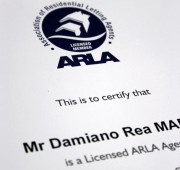Blog
Bring On The Regulation


Regulating the lettings sector is high in the news this month as both RICS and the Association of Residential Lettings Agents (ARLA) press for the current voluntary regulation setup to be made compulsory. At the moment anyone can set up a lettings agency without appropriate qualifications or an understanding of housing law. This leaves both landlords and tenants vulnerable to malpractice and denies both parties long term security.
Much of the debate focuses upon the rights of tenants since they rely heavily on advice from their lettings agent. But before signing on the line, a tenant should ensure the agent is fully qualified and has professional indemnity insurance, client money protection, is fully audited by an accountant and most important is registered with an Ombudsman so dispute may be resolved quickly and impartially.
For both tenant and landlord the tenancy agreement is a cornerstone of their relationship and this document should be explained to both parties, in plain English. If a tenant is still unsure about any aspect of the agreement the Citizens Advice Bureau will be glad to help but with a professional lettings agency this should not be necessary. There is no regulation that says a tenant must have a tenancy agreement and a handshake may suffice in law. Which is fine until the water rates bill comes in – who pays for it? Landlord or tenant?
While the tenant as the end-user deserves protection under law, regulation also offers benefit to landlords. A regulated lettings agent will not simply take their fee; they will work to save their landlords money. A good example is Block Management fees. If a landlord owns apartments in a leased block they will incur fees from a Block Management Agency charged with the upkeep and general running of the block. These companies may run hundreds of blocks throughout the UK.
Frequently, in the case of small charges they will simply bill all landlords for Consent to Let fees or Registration of Tenants. A fee of £40 to change a light bulb is not unheard of. These fees are relatively minor unless a landlord has 20 apartments. A good lettings agency will check the demand against the terms of the lease and deal direct with the Block Management Agency, thus saving their landlord time, money and hassle.
Heaton Property Ltd managing director Damiano Rea says:
“It is astonishing that lettings agency sector remains unregulated unlike our colleagues in estate agency. As more people turn to renting as a long term option both landlords and tenants deserve the security of a well regulated, professionally run industry. We have heard the cry of ‘more red tape’ but nothing could be further from the truth. Once adopted, the ARLA Code of Practice and Rules of Conduct provide a framework which allows us to offer the very best service to our landlord and their tenants. Every business should aspire to be legal, honest, decent and truthful. If it takes regulation to bring these values to the lettings sector, I’d say bring it on”





